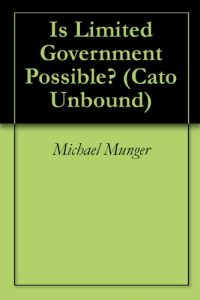If we are going to have a government at all, is there any way to keep it limited to a few basic tasks, or must we reconcile ourselves to an out-of-control leviathan? Can well-designed constitutions keep government reined in, or is any set of limiting rules bound to be undermined over time? Suppose we can't realistically expect a classical liberal limited government. It remains that existing liberal democracies are not unlimited. Aren't there better and worse ways for big government to be big? Do classical liberals and libertarians have anything constructive to say about this? Or should they rather devote themselves entirely to railing against the illegitimate status quo?
To tackle these big questions, we've assembled a crack team of political and legal theorists, starting with Anthony de Jasay, who kicks off with a lead essay reprising the theme of his 1989 essay, "Is Limited Government Possible?" Commenting on de Jasay, we'll have University of Arizona political philosopher Gerald Gaus, author of On Philosophy, Politics and Economics; Michael Munger, chair of the Duke University political science department; and Randy Barnett, professor of law at Georgetown University and author of Restoring the Lost Constitution.
To tackle these big questions, we've assembled a crack team of political and legal theorists, starting with Anthony de Jasay, who kicks off with a lead essay reprising the theme of his 1989 essay, "Is Limited Government Possible?" Commenting on de Jasay, we'll have University of Arizona political philosopher Gerald Gaus, author of On Philosophy, Politics and Economics; Michael Munger, chair of the Duke University political science department; and Randy Barnett, professor of law at Georgetown University and author of Restoring the Lost Constitution.












